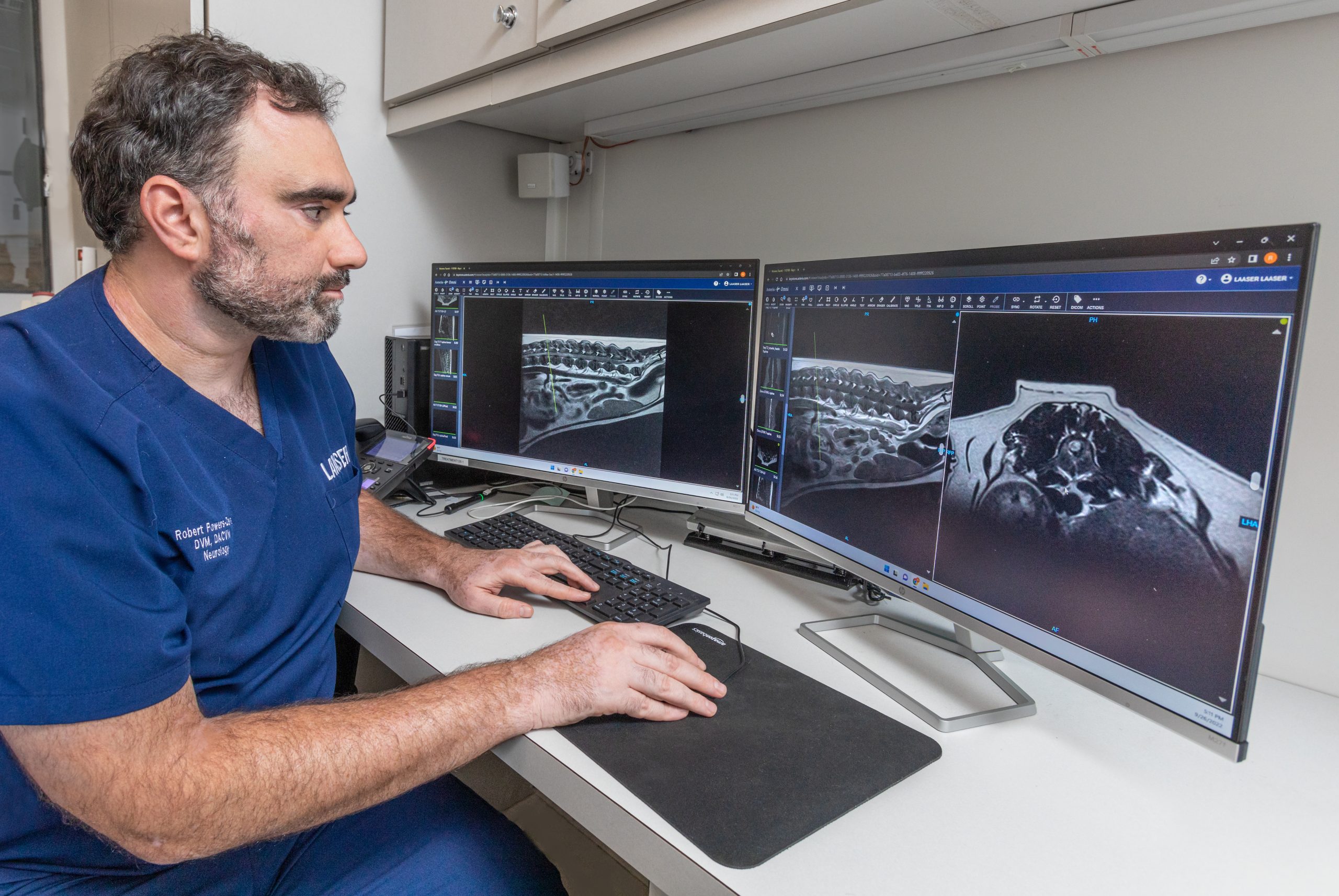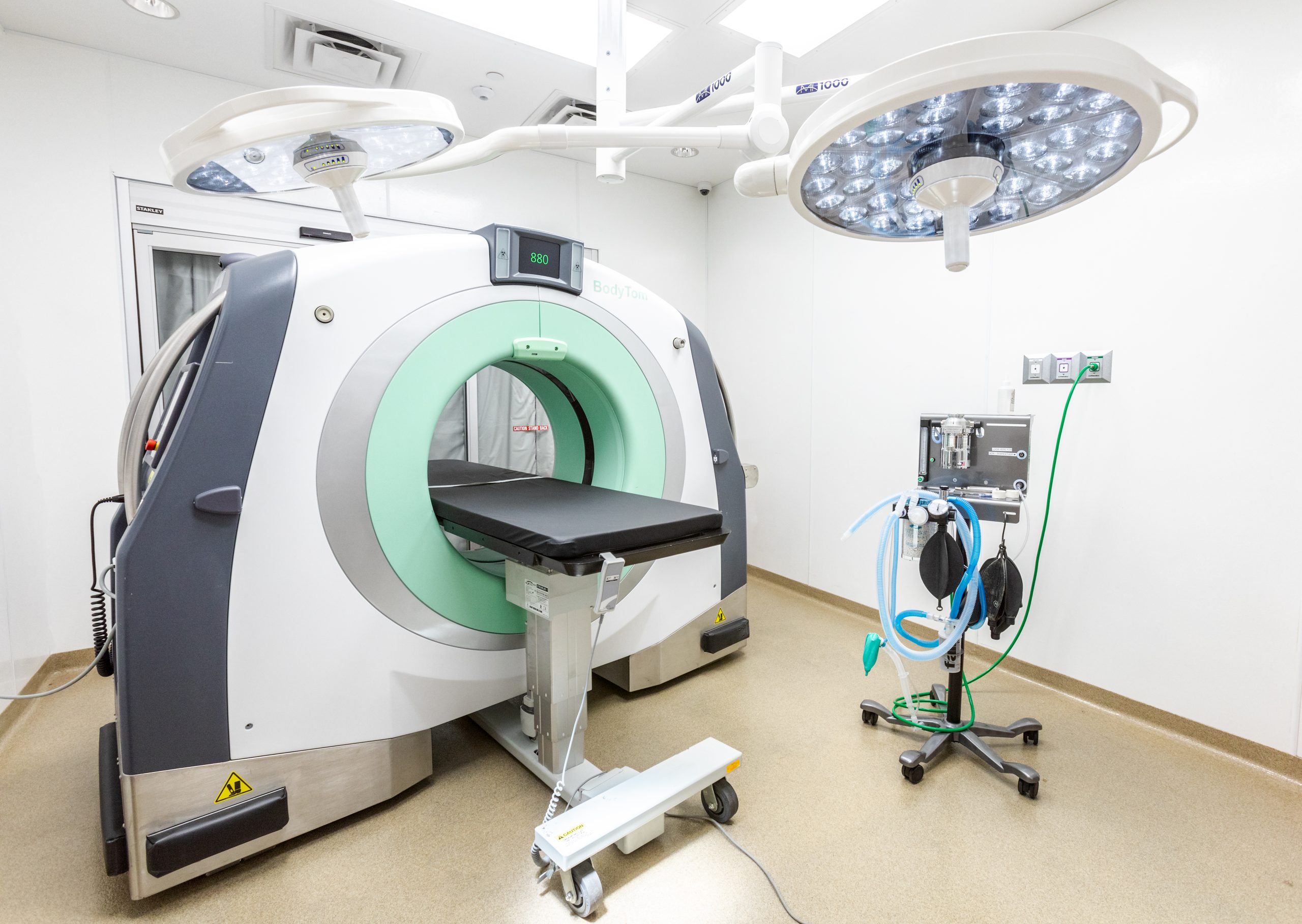Your primary care veterinarian may recommend evaluation by a veterinary neurologist based on the signs your pet is exhibiting. These signs can include:


How can the LAASER Neurology and Neurosurgery team help?
Based on the above signs, Dr. Powers-Davis and his team will take a detailed history and will perform a specialized neurology specific examination. This examination and the detailed history allow us to localize the area of the nervous system that is affected and determine the best next steps for your pet. Depending on these findings and your discussion with Dr. Powers-Davis, additional testing is often required to identify the underlying condition. This could include blood work, infectious disease testing, an MRI and a spinal fluids analysis. Based on these results, treatment can begin. In some cases, this involves starting specific medications to treat the diagnosed underlying disease, but can also involve surgical correction of an underlying issue depending on the findings.
When is the LAASER Neurology and Neurosurgery team available?
The LAASER Neurology and Neurosurgery team sees appointments Monday through Thursday. They also take transfers and perform consults for the Critical Care and Emergency service on days they are in the hospital. On days the neurology team is not in the hospital, the emergency service has extensive training in evaluating pets to determine if the neurology team should be consulted or requires emergency treatment by the neurology team. If your pet is having an emergency or needs to be seen right away, please contact LAASER or bring your pet in through the emergency service.
What constitutes a neurosurgical emergency?
If your pet is too weak to support their own weight or unable to take more than a few steps without support, it is vital that they be brought in immediately. Progression of spinal disease can lead to a decrease in the surgical success rate and it is vital that appropriate intervention be pursued prior to that decrease to give your pet the best chance for recovery. Additionally, if your pet has suffered a trauma, such as falling from a great height or being hit by a car, he should be brought in to be assessed. Our emergency service is available 24/7 to help you determine the correct next steps in these cases.

What training did our Neurologist undergo?
Neurology and Neurosurgery focuses on the treatment of the brain, the spinal cord, the nerves and sometimes even the muscles of the body. A veterinary neurologist is a highly qualified doctor that has pursued many years of additional specialized veterinary training and has dedicated their career to this very specialized branch of veterinary medicine. LAASER’s Neurologists are board-certified in Neurology through the American College of Veterinary Internal Medicine (ACVIM) and have exceeded the requirements to receive that DACVIM credential. Neurologists complete an accredited three-year residency program after their general, rotating internships and education at an accredited four year veterinary school. Neurologists in veterinary medicine are trained in both medical neurology and surgical neurology.
In-house Equipment and diagnostics used on the LAASER Neurology and Neurosurgery service
Siemens Avanto 1.5T 18 Channel MRI
32-Slice BodyTom Neurologica CT Scanner
Digital Radiography with myelography
Canon Aplio Ultrasound with transcranial capability
C-Arm/Fluoroscopic Imaging
Dedicated space and high end tools for detailed Neurological Examination
In-house Laboratory
Cerebrospinal fluid collection and analysis
Conditions Treated/Managed by our Veterinary Neurologist:
Intervertebral disc disease (ie. Slipped Disc, Back Issues)
Concussive Spinal Injury/Spinal trauma
Refractory seizure disorders
Inflammatory diseases of the brain and spinal cord
Including: Granulomatous meningoencephalitis (GME), Meningoencephalitis of Unknown Etiology (MUE) and infectious diseases affecting these areas
Vestibular Syndrome
Brain and Spinal Tumors
Vascular disease/Strokes
Traumatic Brain Injury
Degenerative Disease
Congenital/anomalous disease
Including hydrocephalus, caudal occipital malformation syndrome and spina bifida/dermoid sinus
Common Procedures Offered:
Hemilaminectomies – Most commonly needed surgery for intervertebral disc disease (Slipped disc)
Ventral Slots – Most commonly needed surgery for cervical intervertebral disc disease (Slipped disc)
Craniectomy/Craniotomy for brain tumors, intracranial hematomas and intracranial abscess/infections
Surgical treatment of less common spinal conditions such as subarachnoid diverticulum and spina bifida/dermoid sinus.
Dorsal Laminectomy and other lumbosacral disease surgery
Nerve and Muscle Biopsy
If you would like to schedule an appointment with one of our specialists in the Neurology and Neurosurgery, please call us at 323-800-VETS (8387) or submit an appointment request from the Pet Parent Portal found here: Parent Portal
Los Angeles Animal Specialty Emergency & Rehabilitation uses Accessibility Checker to monitor our website's accessibility.